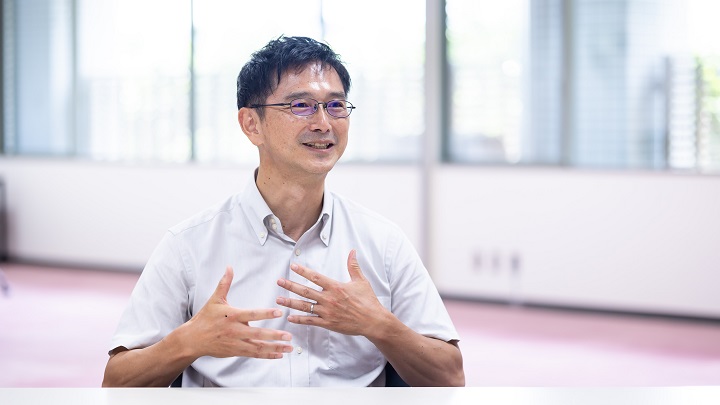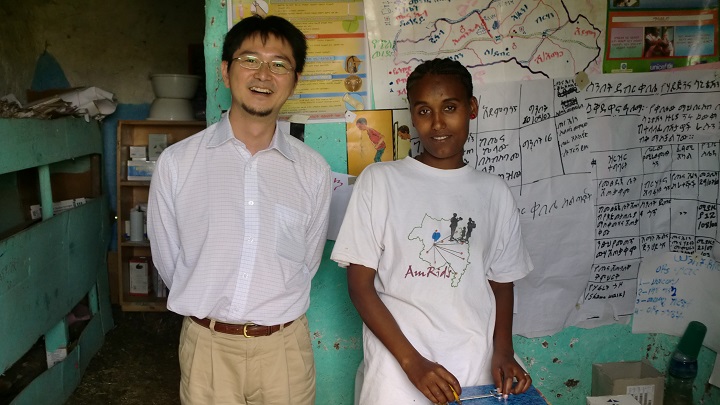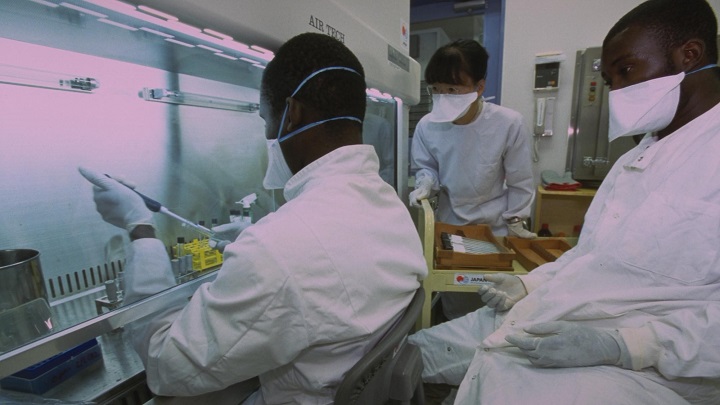Interview With Principal Research Fellow Takizawa Ikuo: Working on Global Health to Make the World a Place Where Everyone Can Enjoy a Healthy Life
2024.11.08
“Global health is a collaborative action to address health challenges around the world,” says Takizawa Ikuo, principal research fellow, the JICA Ogata Sadako Research Institute for Peace and Development (JICA Ogata Research Institute). He has been leading this field at the Japan International Cooperation Agency (JICA) for many years. We asked Takizawa about the challenges global health has been facing in recent years as well as about his aspirations for the 8th Global Symposium on Health Systems Research 2024 (HSR2024), which will be held in November 2024. This is the first HSR symposium to be held in Japan.

―You have been working in this field for many years, so much that some call you “Mr. Global Health of JICA.” What originally led you to this field?
My encounter with global health was in a way by luck. At the time, I was working in the Basic Survey Department, the second department I was assigned to since joining JICA. The US-Japan Common Agenda for Cooperation in Global Perspective (US-Japan Common Agenda) had just been launched so that Japan and the US could collaborate, with the engagement of NGOs, to address population issues, AIDS and other global challenges. As part of our organizational response to these challenges, I was assigned to become in charge of country surveys to design healthcare projects in Asia and Africa.
I majored in development economics as an undergraduate, so healthcare and global health were completely out of my field. However, I was fascinated with the field and went to the Harvard School of Public Health. As I became more familiar with the field, I realized that it is directly involved with people’s lives, forming the foundation of development. If one cannot survive, there are no next steps to begin with. I became confident about the importance of development cooperation in making a world where you can lead a healthy life regardless of your birthplace. This is how I came to devote myself to this field.
Development cooperation in the field of global health becomes successful only when efforts in both science and humanities go hand in hand. Let us look at efforts to eradicate polio from our world as an example. Safe and effective vaccines exist thanks to natural and medical sciences, but to deliver them to people in developing countries, systems that enable vaccine delivery have to be established by applying social sciences such as political science, economics, sociology and anthropology. The dynamism of global health made me excited.
I have been involved in development cooperation in the public health field while being stationed at JICA offices in the Philippines and Kenya. I have also made visits to relevant project sites around the world on business trips. Everywhere I went, I was touched by professionals who devoted themselves to the people’s health, regardless of many difficulties and challenges. I was also able to get acquainted with global health leaders and there was so much to learn from their wise insight. In particular, I have remained close with Professor Miriam Were of Kenya and Professor Francis Omaswa of Uganda, recipients of the Hideyo Noguchi Africa Prize, which honors those who made outstanding achievements in healthcare in Africa. The two have taught me so much. It is really rewarding to be able to work on global health, tackling globally common challenges.

Takizawa (to the left) with a health extension worker (HEW) in Ethiopia. HEWs sustain primary health care in the country.
―During the COVID-19 pandemic, you were the senior director of the Office for COVID-19 Response at JICA and in December 2023, you became a principal research fellow at the JICA Ogata Research Institute. Can you tell us about your work?
The Office for COVID-19 Response was set up based on a sense of urgency and a sense of mission. Although we had to withdraw many of our personnel stationed overseas due to safety reasons, we had to fulfill our responsibilities as a development cooperation agency regardless of the global crisis caused by the COVID-19 pandemic. It was challenging as we had to swiftly develop and deliver a wide range of support programs, including those to collaborate with hospitals and biomedical research institutions and those for the acceleration of vaccine deployment in low- and middle-income countries. However, it was encouraging for us to learn that organizations that JICA had cooperated with, such as the Noguchi Memorial Institute for Medical Research in Ghana and the Cho Ray Hospital in Vietnam, were leading the national responses to the COVID-19 pandemic in their countries. This was a strong sign of successful capacity development in recipient countries, which was precisely what JICA had been advocating and working for.
Currently at the JICA Ogata Research Institute, I am involved in research projects on the following: a review of global and country-level; verification of a novel approaches; and elucidation of the challenges around cancer diagnosis and treatment from the experiences of young cancer patients and their families in Burkina Faso. I am also seeking to strengthen health policy and systems research targeting the challenges of low- and middle- income countries.
―From your perspective based on experience at the frontline, what have been the challenges for global health in recent years?
There are two major challenges for global health described in the Global Health Strategy
that was announced by the Japanese government in 2022. First, we must strengthen health systems in every country to achieve universal health coverage (UHC), to ensure everyone receives necessary healthcare at an affordable cost. Second, we must strengthen the global health architecture, a set of systems to back up national health systems, so that the global community can work in harmony to address global crises like pandemics.
JICA has been working on both challenges. As mentioned earlier, many of the medical facilities that JICA has cooperated with are now functioning as hubs for healthcare delivery in their countries. More recently, JICA is also helping in the development and expansion of medical financial protection schemes. Significantly, the biomedical research institutes that JICA cooperates with are also serving as the indispensable nodes of global surveillance networks that are important in the early detection of the outbreak of infectious diseases. Moreover, there are new yen-loan sub-schemes that have been established after the pandemic and are expected to complement the global financial architecture by supplying financial resources for effective prevention, preparedness and response (PPR) against public health emergencies in low- and middle- income countries.
In fact, from 2020 to 2021 Japan provided the largest amount of Official Development Assistance (ODA) of all G7 countries for COVID-19-related activities. Sadly, there were some backlash arguments like “Japan was going through a hard time and should not be assisting other countries.” However, as we learned from this pandemic, health challenges in other parts of the world are not remote problems but are our own problems as well. Strengthening health systems within other countries as well as those of the global health architecture will help not only the world but also ultimately benefit Japan. There is a convergence of global and national interests in this area. I think it is important to spread this message and widely gain understanding.

With assistance from Japan over the years, the Noguchi Memorial Institute for Medical Research in Ghana, has a well-established system to test specimens that are sent in from across the country.
―In November 2024, JICA and Nagasaki University, together with other local and global partners, will jointly host the 8th Global Symposium on Health Systems Research 2024 (HSR2024). This is a global symposium where health policy and systems research is highlighted. How would you like to make the most of this opportunity?
The Government of Japan has been featuring global health as one of the common challenges at G7 for many years, exerting political leadership. JICA has been extending significant cooperation programs on the ground too. We have an ambition to strengthen our global contribution through knowledge sharing. That was the motivation for us to have this symposium held in Japan. HSR2024 will take place in Nagasaki from November 18 to 22, 2024. Around 1,500 researchers and government officials are expected to come together to have a wide range of discussions on health policy and systems around the world.
I do not want to make this a one-off event. Rather, I am hoping to make it a kickoff event to facilitate health policy and systems research in Japan with focus on low- and middle- income countries. I would also like to strengthen knowledge sharing from Asia. This is because the development of medical financial protection schemes is accelerating in the Asia Pacific and the region has accumulated rich experience to offer to the global community. To prepare for the next pandemic, it is crucial that countries strengthen their health systems autonomously and have a global health architecture to back up the country systems in place. We would like to advocate the importance of not only achieving UHC but also pandemic PPR.
―How will JICA work to solve challenges for global health?
There are limits to what ODA can do. Meanwhile, although people look to financial resources from the private sector as a promising substitute, inequality will be exacerbated as only those who can afford to pay will be able to receive good medical care if we leave everything to the market economy. Therefore, we need to encourage financial commitments from the governments of low- and middle-income countries. I think JICA needs to extend cooperation in catalytic manner to realize a UHC that will ensure everyone has an equal opportunity to receive necessary medical services, in accordance with the unique situation of each country.
Global health is not just a mere list of health challenges around the world or an idealistic vision for our communities. Global health is the collaborative action to address health challenges in the world. We need to keep in mind that JICA is an important part of this effort.

事業事前評価表(地球規模課題対応国際科学技術協力(SATREPS)).国際協力機構 地球環境部 . 防災第一チーム. 1.案件名.国 名: フィリピン共和国.

事業事前評価表(地球規模課題対応国際科学技術協力(SATREPS)).国際協力機構 地球環境部 . 防災第一チーム. 1.案件名.国 名: フィリピン共和国.

事業事前評価表(地球規模課題対応国際科学技術協力(SATREPS)).国際協力機構 地球環境部 . 防災第一チーム. 1.案件名.国 名: フィリピン共和国.

事業事前評価表(地球規模課題対応国際科学技術協力(SATREPS)).国際協力機構 地球環境部 . 防災第一チーム. 1.案件名.国 名: フィリピン共和国.

事業事前評価表(地球規模課題対応国際科学技術協力(SATREPS)).国際協力機構 地球環境部 . 防災第一チーム. 1.案件名.国 名: フィリピン共和国.
scroll